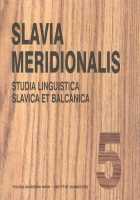Serbskie zmagania z tradycją vukowską po 1991 roku
Serbian issues with Vuk’s tradition after 1991
Author(s): Jerzy MolasSubject(s): Language and Literature Studies
Published by: Instytut Slawistyki Polskiej Akademii Nauk
Summary/Abstract: Since at least mid eighties of the twentieth century Vuk Stefanović Karadžić has been perceived in Serbian social life not only as a language reformer, but first of all as a founder of Serbian national ideology. The thesis credited to him about one Serbian nation using one common language (based on štokavian dialect) although belonging in various confessions and living in different countries, has been developed both by the group of linguists close to Pavle Ivić, as well as followers of radical national concepts – authors and signatories of The Declaration about the Serbian Language. Anyway, those groups have been heavily conflicted. The third national stream in Serbia treats Vuk’s tradition negatively. It comes from the group of people connected with Serbian Orthodox Church, cultivating the national idea typical for so called svetosavlje. According to this concept Karadžić is main originator of Serbian nation misfortune within recent 200 years. He lead to language impoverishment and intelectual diminishment of Serbs, also by breaking with orthodox tradition, he gave the Serbs over for a prey to Vatican and degenerate nations of Western Europe.
Journal: Slavia Meridionalis
- Issue Year: 2005
- Issue No: 05
- Page Range: 265-287
- Page Count: 23
- Language: Polish

